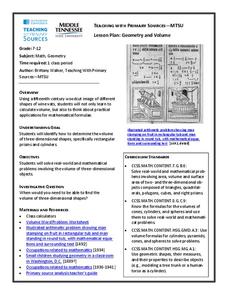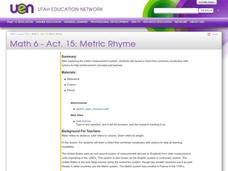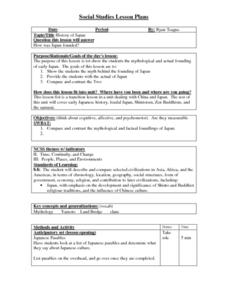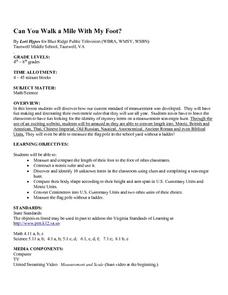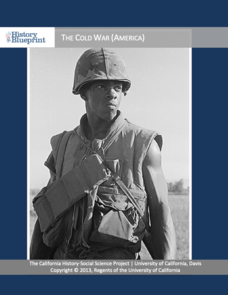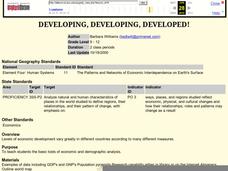Virginia Department of Education
Geometry and Volume
The history of math is fascinating! Utilize a woodcut primary source image from 1492 and posters from the 1930s to help geometers apply their volume-calculation skills to real-life questions.
Curated OER
Timeline of Yellowstone History
Students research important dates and events in the history and development of Yellowstone National Park. They create a timeline that denotes the events after watching the associated video clips.
Curated OER
One Song, Many Voices
Students discuss the purpose and meaning of the song "One Song, Many Voices" and how the music expresses the composer's message. Students sing, conduct, and analyze two different songs during the lesson in a choir setting. This lesson is...
Curated OER
It's Time to Make Time!
Students explore the evolution of time measurement, and explain the relationship of sunrise/sunset to length of daylight. They collect data and calculations to determine length of daylight during a given day.
Curated OER
Metric Rhyme
Students identify various units of measurement. In this measurement lesson, students learn several chants that combine metric vocabulary words and actions to reinforce the concepts learned.
Benjamin Franklin Tercentenary
Benjamin and the Way to A Good Life
Young scholars explore American history by reading biographical text in class. In this Benjamin Franklin lesson, students research the famous inventor by reading assigned text and answering reading comprehension questions afterwards....
Curated OER
Andy Warhol and Silkscreen Pop Art
Students explore art history by researching famous paintings on-line. In this Andy Warhol lesson, students discuss who Warhol was, his impact on popular art and methods of painting. Students examine his use of silk screen printing and...
Curated OER
Masks: History and Artistry
Students research masks and their purposes,. They listen to the teacher read books about masks. Students study techniques for working with clay, they create masks from clay. Students take pictures of the process and the finished project,...
Curated OER
History of the American West
Ninth graders research early mining in California. They study the "placer method" for mining gold, which is surface mining that does not involve tunneling. They examine what it was like for the early miners to pan for gold with...
Curated OER
Linking Kwanzaa to Technology and History
Seventh graders use the Internet to research the holiday of Kwanzaa. Using the information, they create a brochure to promote the holiday to others. They email the information to a friend to end the lesson.
Curated OER
Comparing Time Periods in U.S. History: The Ashford Project
Fifth graders use a "fact book" comparing periods in American history then students create a picture to illustrate their assigned periods. # # students use their pictures and concept maps to write expository paragraphs about their...
Curated OER
Lippmann vs. The Testers: Can Intelligence Be Measured?
Students examine the ideas of Walter Lippman and standardized testing. They discover the ideas and beliefs behind using standarized tests. They examine a copy of an IQ test and discuss.
Curated OER
History of Japan
Students research the mythological and factual founding of early Japan. They compare and contrast the two accounts. As an assessment activity, they fill out a chart that compares and contrasts the facts and myths surrounding Japanese...
Curated OER
Exploring History Through Photographs
Fifth graders compare and contrast photographs from the 1800s to those of 2003. In groups, they create drawings of how society has changed over time and use maps to locate local streets. Individually, they practice measuring the...
Curated OER
Can You Walk a Mile With My Foot?
Young scholars engage in a lesson that is concerned with the measurement of a foot as a customary unit. They take part in a series of activities to help them acquire skills of using a foot to compare other units of measurement. The...
University of California
The Cold War (America)
The Cold War—with its roots in World War II—impacts the world today. Using an extensive curriculum, scholars consider its impact through primary sources, including speeches and propaganda, as well as other skills-enhancing activities. An...
Curated OER
Miss America
The first part of this article by PBS on the Miss America pageants can be used in a health class when it's time to talk about body image. There are links to related articles. There are some great questions for discussion. There are ideas...
Curated OER
Soil Porosity, Moisture Content, pH, and Density
This lab activity does not have to be done with AP environmental scientists. It can also be done with middle to high school earth scientists. The procedures aren't complex. Learners determine the density of dry and wet sand in order to...
Curated OER
Developing, Developing, Developed!
Students differentiate among and explain various levels of economic development around the world. They see that levels of economic development vary greatly in different countries according to many different measures.
Curated OER
What's a Capacitor?
Students explain concepts of charge storage, how a capacitor works and how DRAM uses capacitors to store memory. They construct a capacitor and use a multimeter with capacitance meter capability to measure the stored charge in the...
Curated OER
It's not as pretty as it looks!
Tenth graders investigate that measurement is often an inact science. They explore ways utilize available information to form hypotheses. Students investigate how to test hypotheses using the HACH test kits.
Curated OER
Make a Windmill
Students explore Earth science by conducting an energy experiment in class. In this windmill lesson, students identify how wind has been used to pump water throughout history and the latest developments wind energy has produced. Students...
Curated OER
'Cross the Wide Missouri
Students perform a song, identify melodies, and discuss the history of folk songs.
Curated OER
Ch'in (Qin) Dynasty Debate on Censorship
Sixth graders learn team building, fair play, keeping an open mind towards others' opinions, U.S. government policies, and a better understanding of the meaning of censorship as they debate the merits of censorship.


